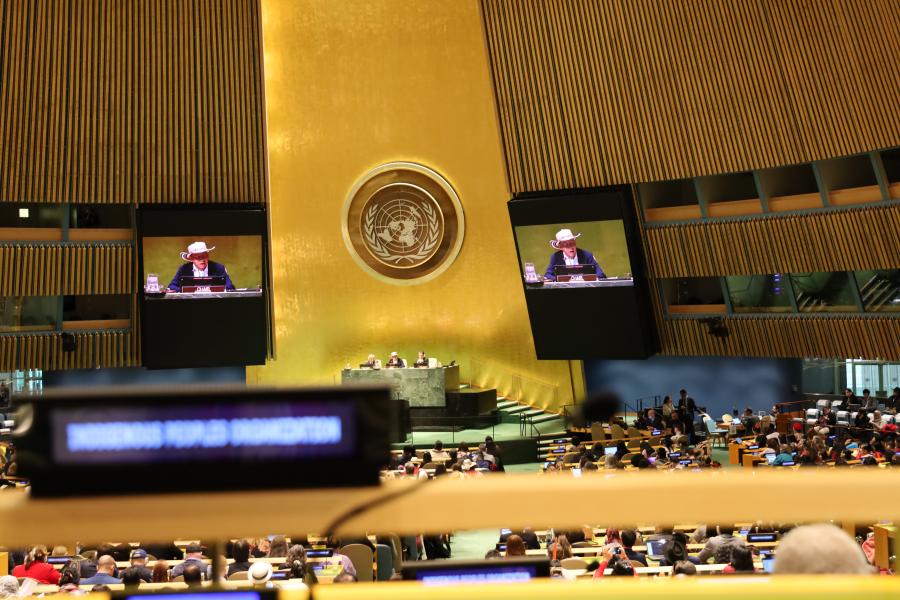
March 7, 2023
'Lead the Charge' Campaign Launches with Scorecard Tracking Human Rights and Environmental Policy in the EV Supply Chain – Most Automakers Fail Indigenous Rights Due Diligence
A coalition of leading human rights, climate, and environmental organizations, including Cultural Survival and First Peoples Worldwide, today launched the global Lead The Charge campaign. The campaign encourages automakers to leverage the unprecedented opportunity offered by the electric vehicle (EV) transition to radically transform their supply chains to be equitable, sustainable, and 100% fossil free. It also raises awareness of the human and Indigenous Peoples’ rights, climate, and environmental impacts that occur throughout auto supply chains, focusing in particular on steel, aluminum, and batteries.
As part of the launch, Lead the Charge unveiled an industry Leaderboard which analyzed the publicly available official reporting of 18 leading automotive manufacturers in the world, ranking their efforts to eliminate emissions, environmental harms, and human rights violations from their supply chains.
While the analysis found that several companies are already working to ensure clean and equitable supply chains, Indigenous Peoples’ rights were the lowest-scoring category in the scorecard. Two-thirds of the automakers scored 0%, and the top score, by Mercedes, was just 17%.
General Motors (GM) is notable as the only company with a human rights policy that respects the rights of Indigenous Peoples as "established and codified" in the UN Declaration of the Rights of Indigenous Peoples (UNDRIP) and ILO Convention 169. However, the company recently invested in a lithium mine with impacts on Native Nations. BMW has an explicit reference to the UNDRIP in their Supplier Code of Conduct, and Mercedes' Human Rights Principles explicitly mention Indigenous rights though not the UNDRIP.
To date, no automaker has implemented concrete processes and mechanisms to ensure that commitments to the rights of Indigenous Peoples are realized throughout their supply chain. Without explicit mention of Free, Prior and Informed Consent (FPIC) as enumerated in the UNDRIP, companies are not able to properly screen for Indigenous Rights Risk, leaving them exposed to legal action, to reputational and operational risks, and to material loss.
“As the world scrambles to address the climate crisis, a new 'green' economy is rapidly emerging. However, in this transition, Indigenous Peoples are facing a new wave of extractivism for transition minerals such as copper, nickel, cobalt, and lithium, which are key in battery development for electric vehicles and other technologies. Indigenous lands, territories, and resources are under direct threat as the demand for these minerals increases. Indigenous Peoples also want to see an end to the climate crisis, but this needs to be achieved in a way that respects their rights," said Galina Angarova (Buryat), Executive Director of Cultural Survival. "For decades, auto supply chains have been riddled with climate, environmental and human rights abuses. The EV transition is an opportunity to change that, but so far it's still business-as-usual for their supply chains, which continue to harm people and the planet. Automakers can stay ahead of the curve by acting now to transform their supply chains and ensure the rights of Indigenous Peoples, and all rights holders, are respected.”
Mercedes leads scorecard rankings overall—demonstrating that automakers can take effective action on both emissions and human rights in their supply chains—while Volvo leads on clean steel and aluminum, and Ford on human rights. While these industry leaders have room to improve, other automakers are lagging far behind. Toyota, the original green leader now EV laggard, is even further behind on supply chains, and while EV leader Tesla has been taking some positive steps on battery supply chains, they are behind overall.
"Indigenous Rights Risk should be a top-line due diligence priority for any company in the electric vehicle and new energy markets. Today 54% of transition minerals projects around the world take place on or near Indigenous Peoples' territories. In the U.S. alone, upwards of 97% of some metals are found within 35 miles of Reservations," said Kate R. Finn, Executive Director of First Peoples Worldwide. "Automakers who have made progress in human rights due diligence and responsible sourcing more broadly must leverage this momentum to expressly identify and prevent violations of Indigenous Peoples’ rights in their supply chains. Without comprehensive processes to solicit and respect Indigenous Peoples' Free, Prior and Informed Consent, automakers will perpetuate the human rights abuses and environmental harms rampant in the extractive economy even as they purport to move towards a more just and green economy."
According to Lead the Charge, the transition to EVs is eliminating the biggest source of transport emissions, the tailpipe. However, as the EV transition accelerates, the emissions profile of the auto industry shifts to supply chain emissions. It is clear that automakers won't meet their climate goals unless supply chain emissions are also tackled with urgency. At the same time, the industry must tackle human rights abuses from mining, refining, and manufacturing in their supply chains. These practices not only harm workers, local communities, and Indigenous Peoples but also pollute local ecosystems and exacerbate the climate crisis.
~
Lead the Charge is a diverse network of local, national, and global advocacy partners working for an equitable, sustainable, and fossil-free auto supply chain. Organizations that have contributed to its development include Cultural Survival, Earthworks, First Peoples Worldwide, Industrious Labs, Investor Advocates for Social Justice, Mighty Earth, Public Citizen, Sierra Club, Solutions for our Climate (SFOC), Transport and Environment (T&E), The Sunrise Project and others.
Cultural Survival and First Peoples Worldwide are part of the Securing Indigenous Rights in the Green Economy (SIRGE) Coalition, a coalition of Indigenous Peoples and leaders, who, along with allies, champion a just transition to a low-carbon economy. As the global demand for the minerals necessary for renewable and green technologies continues to grow, SIRGE calls upon government, corporate, and financial decision-makers to avoid the mistakes of the past: avoid dirty mining and protect the rights and self-determination of Indigenous Peoples around the globe, many of whom live in areas rich in these minerals.
For more information about the campaign, visit Lead the Charge’s website, Twitter account and LinkedIn account.
Lead the Charge Leaderboard key findings:
- While there is some movement by incumbents, like Mercedes and GM, and EV leader Tesla, automakers across the board are falling far short on Indigenous rights. Mercedes was the company with the highest score, but scored only 17%. With a new era of industrial expansion underway, respecting Indigenous Peoples’ self-determination and right to Free, Prior and Informed Consent is more important than ever given how many transition minerals are located on or near Indigenous lands.
- Mercedes leads the charge with many of the best human rights policies and practices and some of the more comprehensive mapping of their transition minerals supply chain.
- Volvo is the stand-out steel and aluminum leader and overall on fossil-free and environmentally sustainable supply chains – but disappointingly came out lower on human rights, including insufficient attention to workers rights and no reference to Indigenous Rights at all.
- Ford shows affordable automakers can do it too, ranking top on human rights overall, principally due to its scores on human rights due diligence, responsible sourcing of transition minerals and worker rights.
- Toyota, the former green darling now biggest EV laggard, is way behind on their supply chain too. Toyota’s supply chain targets and claims seem token at best and as the lowest-ranked automaker for their climate lobbying record by InfluenceMap, they get dragged down even more.
- Tesla, the original and still EV leader, has some problems piling up. They already have new competitors snapping at their heels, a fluctuating stock price, investor discontent, and SEC and worker rights investigations – but they also have significant gaps in disclosure and action on fossil free and environmentally sustainable supply chains.
- BYD and #2 EV maker, despite their vertical integration, is also far behind. With their extensive overseas market ambitions, BYD is quickly grabbing market share but the further BYD reaches, the more they will be exposed to new regulations and expectations, particularly in Europe.
- Hyundai-Kia, now the third-largest automaker in the world and snapping up EV market share, makes sustainable material claims but misses the bigger picture – and opportunity. Sadly, despite slightly outperforming EV leader Tesla in some areas, Hyundai-Kia are trailing overall and have a host of supply chain issues bubbling up, including child labor at suppliers and a subsidiary in the US, and air pollution from steel manufacturing in Korea.
- Lack of disclosure from Chinese automakers meant they scored very low overall – but Geely shows a glimmer of what could be on fossil-free and environmentally sustainable supply chains. They are the leader amongst East Asian automakers on fossil free and environmentally responsible supply chains, on which they also outperform several of their competitors in Europe and the U.S.
###
Media Contacts:
Shannon Jowett: Shannon.Jowett@colorado.edu
Agnes Portalewska: agnes@cs.org


